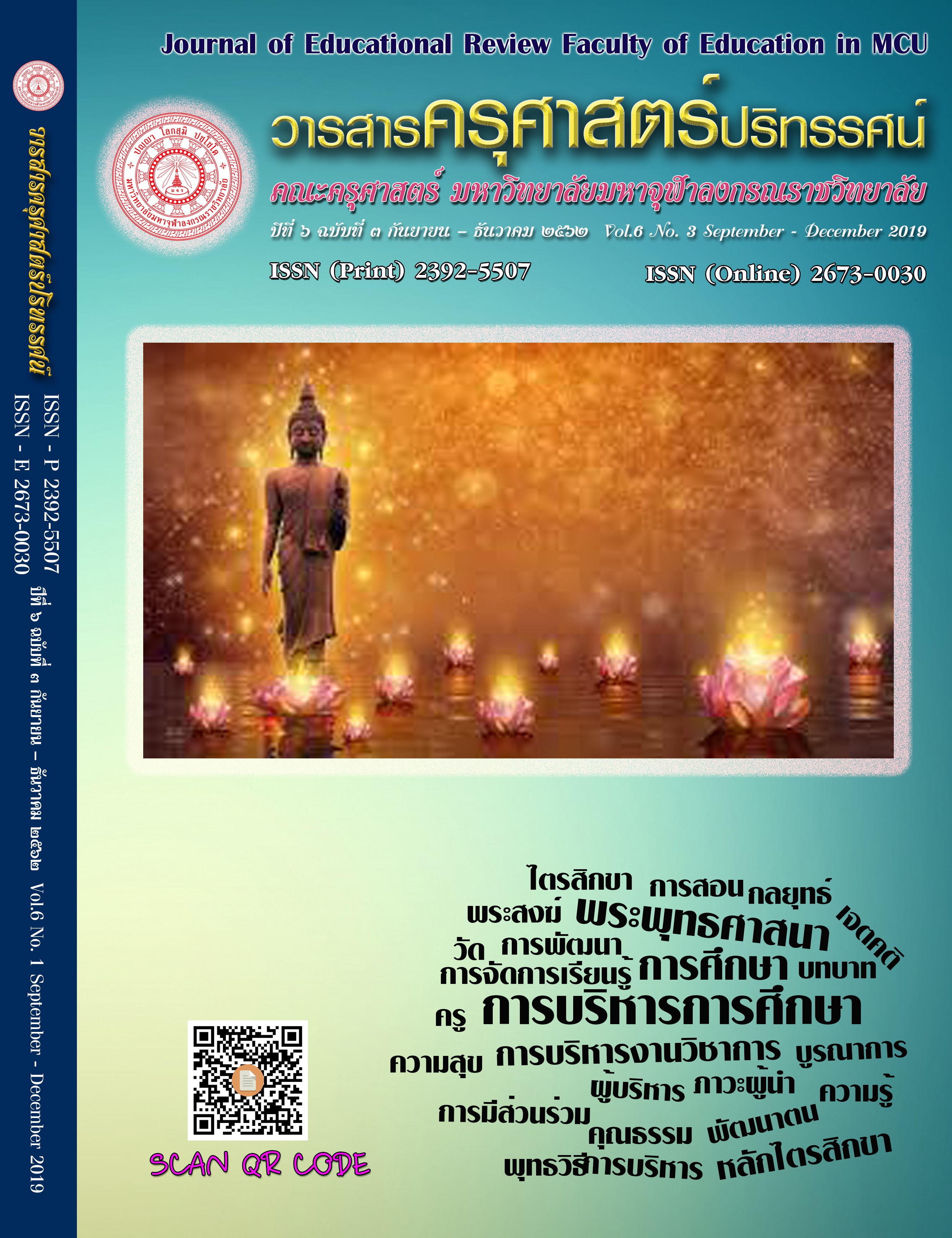Transformational leadership and organization climate affecting the success of the world-class standard schools under the Secondary Educational Service Area Office 18
Main Article Content
Abstract
The purposes of this research were to study the transformational leadership and organization climate those affected the success of the world-class standard schools under the Secondary Educational Service Area Office 18. The sample were 346 teachers from the world-class standard schools under the Secondary Educational Service Area Office 18. A research instruments was a five scale rating survey questionnaire. Data were analyzed by mean, standard deviation, correlation coefficient and stepwise multiple regression analysis.
The research findings were as follows:
- The success of the world-class standard schools under the Secondary Educational Service Area Office 18 in overall were at the moderate level.
- The transformational leadership of school administrators of the world-class standard schools under the Secondary Educational Service Area Office 18 in overall and each aspect were at the high level.
- The organization climate of the world-class standard schools under the Secondary Educational Service Area Office 18 in overall and each aspect were at the good level.
- The correlation of the transformational leadership of the world-class standard schools under the Secondary Educational Service Area Office 18 was found positive relationship with school success at the moderate level and the organization climate was found having positive relationship with the statistical significant at .01 level.
- The transformational leadership and organization climate affected the success of the world-class standard schools under the Secondary Educational Service Area Office 18. The predict equation showed the good predictive variables, they were; organization’s relationship, responsibilities, respect and rewards, and standard. Those are able to influence the prediction of the success of the world-class standard schools with statistically significant at .05 level. The predictive variables are able to influence in the success of the world-class standard schools at 67.30 percent. The predictive equation in raw score and standard score were;
= .96 + 1.67(X26) - 1.20(X23) - .65(X24) + .83(X22)
= 2.03(Z26) - 1.49(Z23) -.81(Z24) + 1.01(Z22)
Article Details
ทัศนะและความคิดเห็นที่ปรากฏในบทความในวารสารฉบับนี้ถือเป็นความรับผิดชอบของผู้เขียนบทความนั้นเพียงผู้เดียว และไม่ถือเป็นทัศนะและความรับผิดชอบของกองบรรณาธิการ
กองบรรณาธิการขอสงวนสิทธิ์ในการคัดเลือกบทความลงตีพิมพ์และจะแจ้งให้เจ้าของบทความทราบหลังจากผู้ประเมินบทความตรวจอ่านบทความแล้ว
ต้นฉบับที่ได้รับการตีพิมพ์ในวารสารครุศาสตร์ปริทรรศน์ คณะครุศาสตร์ มหาวิทยาลัยมหาจุฬาลงกรณราชวิทยาลัย ถือเป็นกรรมสิทธิ์ของคณะครุศาสตร์ มหาวิทยาลัยมหาจุฬาลงกรณราชวิทยาลัย ห้ามนำข้อความทั้งหมดหรือบางส่วนไปพิมพ์ซ้ำ เว้นเสียแต่ว่าจะได้รับอนุญาตจากมหาวิทยาลัยฯ เป็นลายลักษณ์อักษร
References
ชมพูนุท มีหิรัญ. (๒๕๕๙). ภาวะผู้นำการเปลี่ยนแปลงของผู้บริหารโรงเรียนและแรงจูงใจในการปฏิบัติงานของข้าราชการครูที่ส่งผลต่อประสิทธิผลของโรงเรียน สังกัดสำนักงานเขตพื้นที่การศึกษาประถมศึกษาชลบุรี เขต ๓. วิทยานิพนธ์การศึกษามหาบัณฑิต. สาขาวิชาการบริหารการศึกษา. คณะศึกษาศาสตร์: มหาวิทยาลัยบูรพา.
ดารณี คงกระพันธ์. (๒๕๕๗). ภาวะผู้นำการเปลี่ยนแปลงและบรรยากาศองค์การที่ส่งผลต่อประสิทธิผลของสถานศึกษา สังกัดสำนักงานเขตพื้นที่การศึกษาประถมศึกษาชลบุรี เขต ๒. วิทยานิพนธ์การศึกษามหาบัณฑิต สาขาวิชาการบริหารการศึกษา. คณะศึกษาศาสตร์ : มหาวิทยาลัยบูรพา.
บัญชา ปลื้มอารมณ์. (๒๕๕๗). ปัจจัยเชิงสาเหตุที่ส่งผลต่อบรรยากาศโรงเรียนตามการรับรู้ของครูโรงเรียนมัธยมศึกษาสังกัดสำนักงานคณะกรรมการการศึกษาขั้นพื้นฐาน. วิทยานิพนธ์ปรัชญาดุษฎีบัณฑิต สาขาวิชาการบริหารการศึกษา. คณะศึกษาศาสตร์: มหาวิทยาลัยบูรพา.
พรนภา เลื่อยคลัง. (๒๕๕๘). ภาวะผู้นำการเปลี่ยนแปลงของผู้บริหารโรงเรียนที่ส่งผลต่อบรรยากาศองค์การของโรงเรียนมัธยมศึกษา จังหวัดฉะเชิงเทรา สังกัดสำนักงานเขตพื้นที่การศึกษามัธยมศึกษา เขต ๖. วิทยานิพนธ์การศึกษามหาบัณฑิต สาขาวิชาการบริหารการศึกษา. คณะศึกษาศาสตร์: มหาวิทยาลัยบูรพา.
ภารดี อนันต์นาวี. (๒๕๕๑). หลักการ แนวคิด ทฤษฎีทางการบริหารการศึกษา. ชลบุรี: คณะศึกษาศาสตร์ มหาวิทยาลัยบูรพา.
สำนักงานคณะกรรมการการศึกษาแห่งชาติ. (๒๕๕๓). พระราชบัญญัติการศึกษาแห่งชาติ พ.ศ. ๒๕๔๒ และที่แก้ไขเพิ่มเติม (ฉบับที่ ๓) พ.ศ. ๒๕๕๓. กรุงเทพมหานคร: สำนักนายกรัฐมนตรี.
สำนักงานคณะกรรมการพัฒนาการเศรษฐกิจและสังคมแห่งชาติ. (๒๕๕๙). แผนพัฒนาเศรษฐกิจและสังคมแห่งชาติ ฉบับที่สิบสอง พ.ศ. ๒๕๖๐-๒๕๖๔. กรุงเทพมหานคร: สำนักนายกรัฐมนตรี.
สำนักงานเลขาธิการสภาการศึกษา. (๒๕๖๐). แผนการศึกษาแห่งชาติ พ.ศ. ๒๕๖๐-๒๕๗๙. กรุงเทพมหานคร: พริกหวานกราฟฟิค.
สำนักบริหารงานการมัธยมศึกษาตอนปลาย. (๒๕๕๕). แนวทางการจัดการเรียนการสอนในโรงเรียนมาตรฐานสากล ฉบับปรับปรุง. กรุงเทพมหานคร: โรงพิมพ์ชุมนุมสหกรณ์การเกษตรแห่งประเทศไทย.
สำนักบริหารงานการมัธยมศึกษาตอนปลาย. (๒๕๕๕). เป้าหมายและตัวชี้วัดด้านผู้เรียนโรงเรียนมาตรฐานสากล. (ม.ป.ท.).
สุชานุช พันธนียะ. (๒๕๕๓). บรรยากาศองค์การที่ส่งผลต่อคุณภาพชีวิตการทำงานของข้าราชการครู. วิทยานิพนธ์รัฐประศาสนศาสตร์ สาขาวิชาการบริหารทั่วไป. บัณฑิตวิทยาลัย: มหาวิทยาลัยมหิดล.
อรวรรณ เหมนวล. (๒๕๕๔). ความสัมพันธ์ระหว่างบรรยากาศองค์การกับความพึงพอใจในงานตามการรับรู้ของพยาบาลวิชาชีพ โรงพยาบาลกมลาไสย. วิทยานิพนธ์การศึกษามหาบัณฑิต สาขาวิชาการบริหารการศึกษา. คณะศึกษาศาสตร์: มหาวิทยาลัยบูรพา.
Bass, B. M., & Avolio, B. J. (1994). Improving organizational effectiveness through Transformational leadership. Newbury Park, CA: Sage.
Brown, W., & Moberg, D. (1980). Organization theory and management: A macro approach. New York: Wiley & Sons.
King, M. L. (1990). Extraordinary leadership in education: Transformational and transactional leadership as predictors of effectiveness. Satisfaction and organizational climate in K-12 and higher education. Dissertation Abstracts International, 50(8), 2329-A.
Krejcie, R. V., & Morgan, D. W. (1970). Determining sample size for research Activities, Educational and Psychological Measurement, 30(3), 608.
Stringer, R. (2002). Leadership and organization climate. New Jersey: McGraw-Hill.


